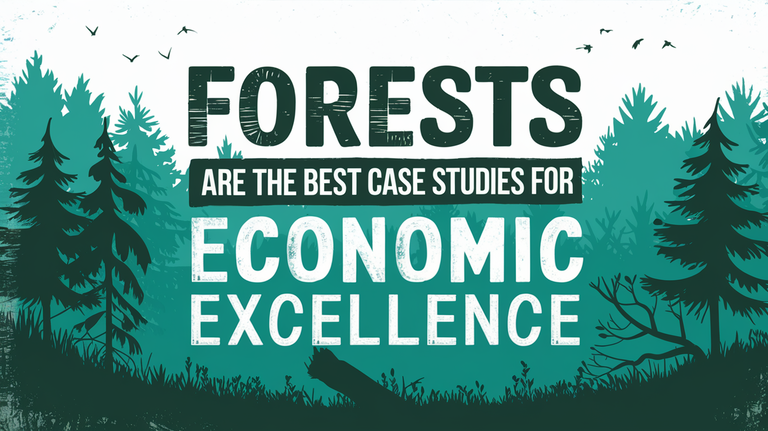Forests play a crucial role in the balance of our environment. Beyond being the lungs of the Earth, they are also key drivers of economic growth and sustainability. Forests offer a natural laboratory for studying how economic principles can thrive in harmony with nature. In this essay, we will explore how forests contribute to economic excellence, focusing on their role in providing resources, maintaining ecological balance, supporting livelihoods, and fostering sustainable development.
Forests as Natural Resources
Forests are a source of many valuable resources. Timber, firewood, fruits, medicinal plants, and even honey are harvested from forests. These resources have been traded and used for centuries, fueling economies both locally and globally. For instance, timber is used in construction, furniture, and paper industries, making it a multi-billion-dollar industry.
Besides timber, forests are also home to a wealth of non-timber forest products (NTFPs), including rubber, resins, and oils. These materials are used in many sectors, from cosmetics to pharmaceuticals. Economically, NTFPs provide employment to many rural and tribal communities. This not only uplifts local economies but also contributes to national economies through trade and export.
Ecosystem Services: The Invisible Wealth
Forests provide ecosystem services that are critical for economic stability. Ecosystem services refer to benefits that humans derive from nature, such as clean air, water, and fertile soil. For example, forests help regulate the water cycle by absorbing rainfall and releasing it gradually, preventing floods. This service protects agricultural lands and urban areas, reducing economic losses caused by natural disasters.
Carbon sequestration is another vital service provided by forests. Forests absorb carbon dioxide, a greenhouse gas, and help mitigate climate change. By doing so, they contribute to long-term economic stability by reducing the impacts of climate-induced disasters. This is especially relevant as climate change becomes a major economic concern globally. Countries with large forest areas, such as Brazil and Indonesia, can harness this to participate in global carbon markets, thus generating revenue.
Employment and Livelihoods
Forests are a source of employment for millions of people worldwide. In many developing countries, forests support the livelihoods of indigenous communities, farmers, and rural populations. Activities such as logging, gathering forest products, and eco-tourism generate jobs for local people. Eco-tourism, in particular, has become a growing industry, where people visit forests for recreational purposes, creating jobs in hospitality, guiding, and conservation work.
India, for example, has vast forest cover that sustains a variety of livelihoods. The Forest Rights Act of 2006 recognizes the rights of forest-dwelling communities, allowing them to manage and use forest resources in a sustainable manner. This legal framework not only provides economic benefits but also promotes social equity.
Sustainable Development and Forest Management
Sustainability is a key aspect of modern economic policies, and forests are at the center of sustainable development. The concept of sustainable forest management (SFM) is based on the idea that forests can be utilized for economic purposes without depleting their resources. SFM practices aim to balance the extraction of forest products with conservation efforts, ensuring that forests continue to thrive for future generations.
One successful example of sustainable forest management comes from Scandinavian countries like Sweden and Finland. These nations have developed forestry models that maximize economic output while preserving forest ecosystems. Their timber industry is one of the most advanced in the world, contributing significantly to the economy while ensuring that forests are replanted and managed effectively. This balance between economic gain and environmental preservation is a testament to the economic excellence that forests represent.
Forests and Global Markets
The global demand for forest products has created new economic opportunities. Forests contribute significantly to international trade through the export of timber, paper products, and other materials. Countries with rich forest resources are able to tap into these markets, boosting their economies.
Additionally, the emergence of green markets, such as carbon trading and sustainable products, highlights how forests are becoming integral to the modern global economy. Countries with well-managed forests can benefit from carbon credits, attracting investments from companies looking to offset their carbon emissions. This creates a win-win situation where forests are protected, and countries generate revenue.
The Role of Forests in Circular Economies
In recent years, the idea of a circular economy has gained attention. A circular economy is one where resources are reused and recycled, minimizing waste. Forests naturally fit into this model. For example, paper and wood products can be recycled multiple times, reducing the need for new raw materials. Furthermore, the waste from timber processing, such as sawdust, can be converted into energy, making forests a key player in the transition to a more sustainable economy.
In this context, countries and businesses that focus on forest conservation and sustainable use of resources are not only contributing to environmental well-being but also advancing economic excellence. Circular economies that incorporate forest products promote efficiency and innovation, key drivers of economic growth.
Challenges and Opportunities
While forests offer immense economic potential, they also face significant challenges. Deforestation, illegal logging, and land conversion for agriculture threaten forest ecosystems worldwide. These activities can have severe economic consequences, including loss of biodiversity, soil degradation, and disruption of water cycles, which can lead to long-term economic losses.
However, these challenges also present opportunities. With increasing awareness about climate change and environmental degradation, there is a growing market for sustainable products and eco-friendly practices. Governments and businesses are investing in reforestation projects, sustainable logging practices, and forest conservation efforts. For example, the United Nations’ REDD+ program (Reducing Emissions from Deforestation and Forest Degradation) encourages developing countries to reduce deforestation by providing financial incentives.
The Way Forward: Policies for Forest-Based Economic Excellence
To fully realize the economic potential of forests, governments must adopt policies that promote sustainable forest management. This includes creating incentives for businesses to invest in sustainable practices, enforcing laws against illegal logging, and supporting indigenous communities who have traditionally managed forests.
Education and awareness campaigns are also crucial. By teaching communities and businesses about the economic and environmental benefits of forests, we can encourage more responsible behavior. Governments can also collaborate with international organizations to share best practices in forest management and conservation.
Finally, innovation in forest management technologies can help optimize the use of forest resources. For instance, satellite imagery and drones can monitor forest health and prevent illegal activities. These technologies can lead to more efficient management, ensuring that forests continue to provide economic benefits.
Read More: The True Essence of Education is what remains after one has forgotten what one has learned in school
Conclusion
In conclusion, forests are indeed the best case studies for economic excellence. They provide essential resources, ecosystem services, employment opportunities, and support sustainable development. By managing forests wisely, we can balance economic growth with environmental preservation. The examples of sustainable forest management from around the world show that it is possible to harness the economic potential of forests without compromising their ecological value. In the face of global challenges like climate change, forests offer a model of how economies can thrive in harmony with nature.







